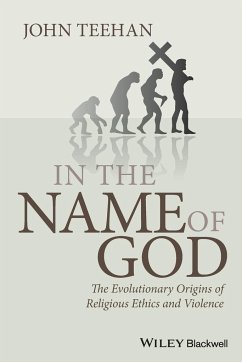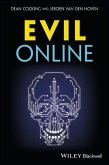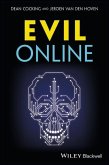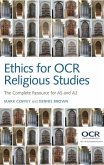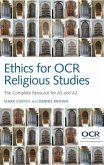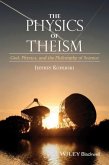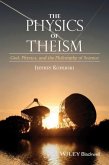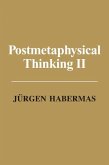Contrary to the popular belief that religious violence is a corruption of true religion, carried out by individuals who twist its teachings, Teehan argues that religious violence is in fact grounded in the moral psychology of religion. In the Name of God represents a fundamentally new approach to the analysis of religion. By applying evolutionary psychology, we can gain a fresh perspective on religious texts, and a better understanding of their contradictions and complexities, critical in combating religious violence, and promoting a more moral society.
Religion is one of the most powerful forces running through humanhistory, and although often presented as a force for good, itsimpact is frequently violent and divisive. This provocative workbrings together cutting-edge research from both evolutionary andcognitive psychology to help readers understand the psychologicalstructure of religious morality and the origins of religiousviolence.
Introduces a fundamentally new approach to the analysis ofreligion in a style accessible to the general reader
Applies insights from evolutionary and cognitive psychology toboth Judaism and Christianity, and their texts, to help understandthe origins of religious violence
Argues that religious violence is grounded in the moralpsychology of religion
Illustrates its controversial argument with reference to the9/11 terrorist attacks, and the response to the attacks from boththe terrorists and the President. Suggests strategies for beginningto counter the divisive aspects of religion
Discusses the role of religion and religious criticism in thecontemporary world. Argues for a position sceptical of the moralauthority of religion, while also critiquing the excesses of the"new atheists" for failing to appreciate the moralcontributions of religion
Awarded Honourable Mention, 2010 Prose Awards
Hinweis: Dieser Artikel kann nur an eine deutsche Lieferadresse ausgeliefert werden.
Religion is one of the most powerful forces running through humanhistory, and although often presented as a force for good, itsimpact is frequently violent and divisive. This provocative workbrings together cutting-edge research from both evolutionary andcognitive psychology to help readers understand the psychologicalstructure of religious morality and the origins of religiousviolence.
Introduces a fundamentally new approach to the analysis ofreligion in a style accessible to the general reader
Applies insights from evolutionary and cognitive psychology toboth Judaism and Christianity, and their texts, to help understandthe origins of religious violence
Argues that religious violence is grounded in the moralpsychology of religion
Illustrates its controversial argument with reference to the9/11 terrorist attacks, and the response to the attacks from boththe terrorists and the President. Suggests strategies for beginningto counter the divisive aspects of religion
Discusses the role of religion and religious criticism in thecontemporary world. Argues for a position sceptical of the moralauthority of religion, while also critiquing the excesses of the"new atheists" for failing to appreciate the moralcontributions of religion
Awarded Honourable Mention, 2010 Prose Awards
Hinweis: Dieser Artikel kann nur an eine deutsche Lieferadresse ausgeliefert werden.
"Teehan ... offers provocative discussion about the role of these exciting sub-disciplines of psychology in explaining religion and violence. Teehan illustrates that we can come to some very similar conclusions by using a secular approach to religious violence. In sum, this book is very useful in exploring the potential of evolutionary psychology in explaining religious violence." -- Free Inquiry, August/September 2010
"In summary, this is an excellent book. It gives a good summary of current scientific understanding of evolution of morality and religion. It discusses religious violence as the other side of the moral coin. And there is a useful discussion of the problem of religion in modern society and ways we can overcome the negative aspects of our evolved moral and cognitive systems." (Open Parachute, 27 October 2013) "This book is a contribution to the study of religion from an evolutionary perspective . . . Teehan carefully distinguishes between methodological and metaphysical naturalism and officially adopts the former but not the latter." (Theology, 1 September 2011)
"All scholars interested in religious ethics but also in fresh approaches to reading the Bible will find something of value. This provocative book is a significant contribution to the ongoing discourse about religious ethics and for this reason deserves careful engagement." (Theological Book Review, 2011)
"In the Name of God, by John Teehan, takes the evolutionary framework and applies it to the reading of religious texts. The result is a provocative discussion of the ubiquitous phenomenon of religious belief that can change the way we understand the role of religion in society... .Teehan's analysis spans a wide range of material but his incisive and focused approach conveys arguments without overwhelming the reader....Overall, Teehan does a commendable job elucidating his thesis of religion as moral innovation while treating the material with sensitivity and respect... .The result is an enjoyable read packed with insights, covering research from a wide range of disciplines, which will appeal to both the researcher in the field as well as the interested layman. Anyone who has pondered the nature of religion and its apparent contradictions will find In the Name of God a gem and emerge with a deeper understanding of morality and the religious mind." (Evolutionary Psychology, February, 2011)
"In the Name of God: The Evolutionary Origins of Religious Ethics and Violence, John Teehan sets out an evolutionary-psychological account of the connection between religion, morality and violence... .What results is an intriguing and cogent theory that promises a significant advance in our understanding of the place of religion in human history and society." (Metapsychology, January, 2011)
"In the Name of God is an excellent popular presentation of the scientific understanding of the origins of religion and morality. It also examines the origins of religious violence and opens a discussion on the way humanity may reduce these problems. Some people will find it controversial. But not because some trends in evolutionary psychology have discredited themselves with extravagant claims. In this case the controversy will be because, as Teehan puts it, 'this view of human nature - the very idea that there might be a human nature - smacks up against some strongly held political, moral, religious, and ideological positions.' In summary, this is an excellent book. It gives a good summary of current scientific understanding of evolution of morality and religion. It discusses religious violence as the other side of the moral coin. And there is a useful discussion of the problem of religion in modern society and ways we can overcome the negative aspects of our evolved moral and cognitive systems.... .The evolutionary study of religion and morality is a new science, but already a fruitful one. This book provides the ideal introduction." (Open Parachute, July 2010)
"This is an exceedingly provocative study and one that merits careful attention from general readers and scholars alike. Highly recommended." (Choice, December 2010)
"After decades of discussing evolution-related arguments for and against the existence of God, scholars have become aware that the theory of evolution can possibly be seen as accounting for the existence of religion itself. If evolutionary biology does indeed explain the emergence of religion, what then? Will the claims of religion be irretrievably undermined? These questions form the backbone of Teehan's impressive study. He concentrates on two aspects of the phenomenon of religion: morality and violence. For Teehan ... violence is not a corruption of religion but, in a way, one of its essential ingredients. He argues that the elements of religion that motivate pro-community moral attitudes are the very same elements that produce division, prejudice, aggression and violence... .Teehan's main contribution comes from applying evolutionary psychology to gain exciting new insights into this area of anthropology....the inquiry needs to continue. The next step should start from where Teehan and others like him have achieved so far." (Ars Disputandi, December 2010)
"Drawing on evolutionary assumptions and evidence, Teehan argues that religion can be understood within the context of the natural development of human moral systems, apart from any actual transcendent moral agency. He succinctly and helpfully summarizes his evolutionary approach to the origins of human religiousness. Then he uses it to analyze the (Jewish) Ten Commandments and the (Christian) ethical teachings of Jesus and, finally, to show that religious violence is inherent in the in-group/out-group nature of religion itself... .Teehan's naturalism is commendable ... .An informative ... study." (Library Journal, July 2010)
"Evolutionary and cognitive psychology are now at the forefront of explaining the origin and function of human morality. In this book, In the Name of God: The Evolutionary Origins of Religious Ethics and Violence, John Teehan offers a provocative discussion about the role of these exciting sub-disciplines of psychology in explaining religion and violence ... this book is very useful in exploring the potential of evolutionary psychology in explaining religious violence." (Free Inquiry, August/September, 2010)
"In terms of specifically 'religious' expressions of social solidarity. His account of the dynamics of varying coalitions of them and us would be compatible with, and perhaps even mildly supplement, the standard social scientific understanding of the sources of group violence, for example, in international relations." (Times Literary Supplement, 17 December 2010)
"All scholars interested in religious ethics but also in fresh approaches to reading the Bible will find something of value. This provocative book is a significant contribution to the ongoing discourse about religious ethics and for this reason deserves careful engagement." (Theological Book Review, 2011)
"In the Name of God, by John Teehan, takes the evolutionary framework and applies it to the reading of religious texts. The result is a provocative discussion of the ubiquitous phenomenon of religious belief that can change the way we understand the role of religion in society... .Teehan's analysis spans a wide range of material but his incisive and focused approach conveys arguments without overwhelming the reader....Overall, Teehan does a commendable job elucidating his thesis of religion as moral innovation while treating the material with sensitivity and respect... .The result is an enjoyable read packed with insights, covering research from a wide range of disciplines, which will appeal to both the researcher in the field as well as the interested layman. Anyone who has pondered the nature of religion and its apparent contradictions will find In the Name of God a gem and emerge with a deeper understanding of morality and the religious mind." (Evolutionary Psychology, February, 2011)
"In the Name of God: The Evolutionary Origins of Religious Ethics and Violence, John Teehan sets out an evolutionary-psychological account of the connection between religion, morality and violence... .What results is an intriguing and cogent theory that promises a significant advance in our understanding of the place of religion in human history and society." (Metapsychology, January, 2011)
"In the Name of God is an excellent popular presentation of the scientific understanding of the origins of religion and morality. It also examines the origins of religious violence and opens a discussion on the way humanity may reduce these problems. Some people will find it controversial. But not because some trends in evolutionary psychology have discredited themselves with extravagant claims. In this case the controversy will be because, as Teehan puts it, 'this view of human nature - the very idea that there might be a human nature - smacks up against some strongly held political, moral, religious, and ideological positions.' In summary, this is an excellent book. It gives a good summary of current scientific understanding of evolution of morality and religion. It discusses religious violence as the other side of the moral coin. And there is a useful discussion of the problem of religion in modern society and ways we can overcome the negative aspects of our evolved moral and cognitive systems.... .The evolutionary study of religion and morality is a new science, but already a fruitful one. This book provides the ideal introduction." (Open Parachute, July 2010)
"This is an exceedingly provocative study and one that merits careful attention from general readers and scholars alike. Highly recommended." (Choice, December 2010)
"After decades of discussing evolution-related arguments for and against the existence of God, scholars have become aware that the theory of evolution can possibly be seen as accounting for the existence of religion itself. If evolutionary biology does indeed explain the emergence of religion, what then? Will the claims of religion be irretrievably undermined? These questions form the backbone of Teehan's impressive study. He concentrates on two aspects of the phenomenon of religion: morality and violence. For Teehan ... violence is not a corruption of religion but, in a way, one of its essential ingredients. He argues that the elements of religion that motivate pro-community moral attitudes are the very same elements that produce division, prejudice, aggression and violence... .Teehan's main contribution comes from applying evolutionary psychology to gain exciting new insights into this area of anthropology....the inquiry needs to continue. The next step should start from where Teehan and others like him have achieved so far." (Ars Disputandi, December 2010)
"Drawing on evolutionary assumptions and evidence, Teehan argues that religion can be understood within the context of the natural development of human moral systems, apart from any actual transcendent moral agency. He succinctly and helpfully summarizes his evolutionary approach to the origins of human religiousness. Then he uses it to analyze the (Jewish) Ten Commandments and the (Christian) ethical teachings of Jesus and, finally, to show that religious violence is inherent in the in-group/out-group nature of religion itself... .Teehan's naturalism is commendable ... .An informative ... study." (Library Journal, July 2010)
"Evolutionary and cognitive psychology are now at the forefront of explaining the origin and function of human morality. In this book, In the Name of God: The Evolutionary Origins of Religious Ethics and Violence, John Teehan offers a provocative discussion about the role of these exciting sub-disciplines of psychology in explaining religion and violence ... this book is very useful in exploring the potential of evolutionary psychology in explaining religious violence." (Free Inquiry, August/September, 2010)
"In terms of specifically 'religious' expressions of social solidarity. His account of the dynamics of varying coalitions of them and us would be compatible with, and perhaps even mildly supplement, the standard social scientific understanding of the sources of group violence, for example, in international relations." (Times Literary Supplement, 17 December 2010)

